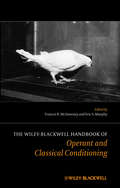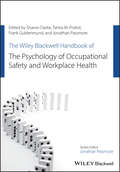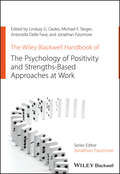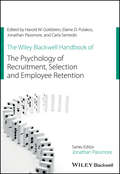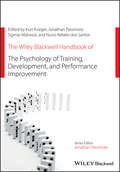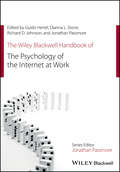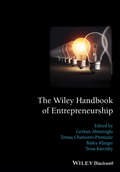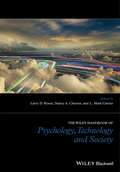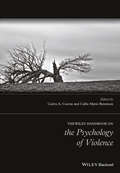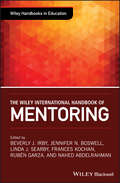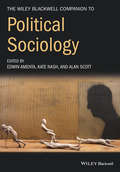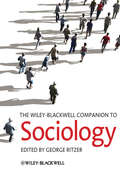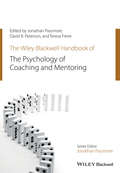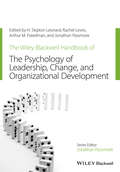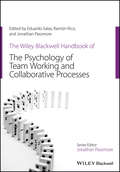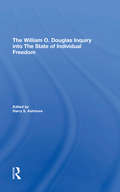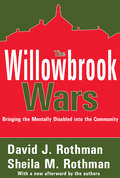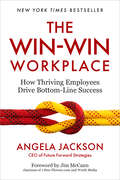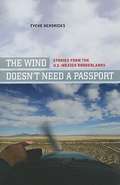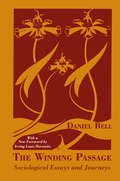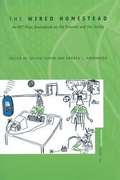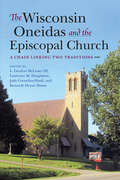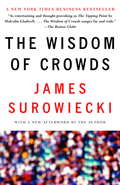- Table View
- List View
The Wiley Blackwell Handbook of Operant and Classical Conditioning
by Frances K. McSweeney Eric S. MurphyThis combined survey of operant and classical conditioning provides professional and academic readers with an up-to-date, inclusive account of a core field of psychology research, with in-depth coverage of the basic theory, its applications, and current topics including behavioral economics. Provides comprehensive coverage of operant and classical conditioning, relevant fundamental theory, and applications including the latest techniques Features chapters by leading researchers, professionals, and academicians Reviews a range of core literature on conditioning Covers cutting-edge topics such as behavioral economics
The Wiley Blackwell Handbook of the Psychology of Occupational Safety and Workplace Health
by Jonathan Passmore Frank W. Guldenmund Sharon Clarke Tahira M. ProbstA Wiley Blackwell Handbook of Organizational Psychology focusing on occupational safety and workplace health. The editors draw on their collective experience to present thematically structured material from leading thinkers and practitioners in the USA, Europe, and Asia Pacific Provides comprehensive coverage of the major contributions that psychology can make toward the improvement of workplace safety and employee health Equips those who need it most with cutting-edge research on key topics including wellbeing, safety culture, safety leadership, stress, bullying, workplace health promotion and proactivity
The Wiley Blackwell Handbook of the Psychology of Positivity and Strengths-Based Approaches at Work
by Jonathan Passmore Lindsay G. Oades Michael Steger Antonelle Delle FaveA state-of-the-art psychological perspective on positivity and strengths-based approaches at work This handbook makes a unique contribution to organizational psychology and HRM by providing comprehensive international coverage of the contemporary field of positivity and strengths-based approaches at work. It provides critical reviews of key topics such as resilience, wellbeing, hope, motivation, flow, authenticity, positive leadership and engagement, drawing on the work of leading thinkers including Kim Cameron, Shane Lopez, Peter Clough and Robert Biswas-Diener.
The Wiley Blackwell Handbook of the Psychology of Recruitment, Selection and Employee Retention
by Jonathan Passmore Carla Semedo Elaine D. Pulakos Harold W. GoldsteinThis handbook makes a unique contribution to the fields of organizational psychology and human resource management by providing comprehensive coverage of the contemporary field of employee recruitment, selection and retention. It provides critical reviews of key topics such as job analysis, technology and social media in recruitment, diversity, assessment methods and talent management, drawing on the work of leading thinkers including Melinda Blackman, Nancy Tippins, Adrian Furnham and Binna Kandola. The contributors are drawn from diverse backgrounds and a wide range of countries, giving the volume a truly international feel and perspective. Together, they share important new work which is being undertaken around the globe but is not always easily accessible to real-world practitioners and students.
The Wiley Blackwell Handbook of the Psychology of Training, Development, and Performance Improvement
by Jonathan Passmore Sigmar Malvezzi Kurt Kraiger Nuno Rebelo dos SantosThe latest Wiley Blackwell Handbook of Organizational Psychology uses a psychological perspective, and a uniquely global focus, to review the latest literature and research in the interconnected fields of training, development, and performance appraisal.Maintains a truly global focus on the field with top international contributors exploring research and practice from around the worldOffers researchers and professionals essential information for building a talented organization, a critical and challenging task for organizational success in the 21st centuryCovers a diverse range of topics, including needs analysis, job design, active learning, self-regulation, simulation approaches, 360-degree feedback, and virtual learning environments
The Wiley Blackwell Handbook of the Psychology of the Internet at Work
by Jonathan Passmore Dianna L. Stone Guido Hertel Richard D JohnsonThis authoritative Wiley Blackwell Handbook in Organizational Psychology focuses on individual and organizational applications of Internet-enabled technologies within the workplace. The editors have drawn on their collective experience in collating thematically structured material from leading writers based in the US, Europe, and Asia Pacific. Coinciding with the growing international interest in the application of psychology to organizations, the work offers a unique depth of analysis from an explicitly psychological perspective. Each chapter includes a detailed literature review that offers academics, researchers, scientist-practitioners, and students an invaluable frame of reference. Coverage is built around competencies set forth by regulatory agencies including the APA and BPS, and includes cyberloafing, ergonomics of human-computer interaction at work, permanent accessibility and work-life balance, and trust in online environments.
The Wiley Handbook of Entrepreneurship
by Tomas Chamorro-Premuzic Bailey Klinger Gorkan Ahmetoglu Tessa KarciskyWritten by leading scholars, The Wiley Handbook of Entrepreneurship provides a distinctive overview of methodological, theoretical and paradigm changes in the area of entrepreneurship research. It is divided into four parts covering history and theory, individual differences and creativity, organizational aspects of innovation including intrapreneurship, and macroeconomic aspects such as social entrepreneurship and entrepreneurship in developing countries. The result is a must-have resource for seasoned researchers and newcomers alike, as well as practitioners and advanced students of business, entrepreneurship, and social and organizational psychology.
The Wiley Handbook of Psychology, Technology, and Society
by Larry D. Rosen Nancy A. Cheever L. Mark CarrierEdited by three of the world's leading authorities on the psychology of technology, this new handbook provides a thoughtful and evidence-driven examination of contemporary technology's impact on society and human behavior. Includes contributions from an international array of experts in the field Features comprehensive coverage of hot button issues in the psychology of technology, such as social networking, Internet addiction and dependency, Internet credibility, multitasking, impression management, and audience reactions to media Reaches beyond the more established study of psychology and the Internet, to include varied analysis of a range of technologies, including video games, smart phones, tablet computing, etc. Provides analysis of the latest research on generational differences, Internet literacy, cyberbullying, sexting, Internet and cell phone dependency, and online risky behavior
The Wiley Handbook on the Psychology of Violence
by Callie Marie Rennison Carlos A. CuevasThe Wiley Handbook on the Psychology of Violence features a collection of original readings, from an international cast of experts, that explore all major issues relating to the psychology of violence and aggressive behaviors. Features original contributions from an interdisciplinary cast of scholars - leading experts in their fields of study Includes the latest violence research – and its implications for practice and policy Offers coverage of current issues relating to violence such as online violence and cybercriminal behavior Covers additional topics such as juvenile violence, sexual violence, family violence, and various violence issues relating to underserved and/or understudied populations
The Wiley International Handbook of Mentoring (Wiley Handbooks In Education Ser.)
by Frances Kochan Beverly J. Irby Jennifer N. Boswell Linda J. Searby Rub N Garza Nahed AbdelrahmanThe first collection in the area of mentoring that applies theory to real-world practice, research, programs, and recommendations from an international perspective In today’s networked world society, mentoring is a crucial area for study that requires a deep international understanding for effective implementation. Despite the immense benefits of mentoring, current literature on this subject is surprisingly sparse. The Wiley International Handbook of Mentoring fills the need for a comprehensive volume of in-depth information on the different types of mentoring programs, effective mentoring practices, and emerging practical and applicable theories. Based on sound research methodologies, this unique text presents original essays by experts from over ten different countries, demonstrating the ways mentoring can make a difference in the workplace and in the classroom; these experts have an understanding of mentoring worldwide having worked in mentoring in over forty countries. Each of the Handbook’s four sections—mentoring paradigms, practices, programs, and possibilities—include a final synthesis chapter authored by the section editors that captures the essence of the lessons learned, applies a global context, and recommends research avenues for further exploration. This innovative volume demonstrates how mentoring in any culture can help employees to complete tasks and advance in their positions, aid in socialization and assimilation in various settings, provide diverse groups access to resources and information, navigate through personalities, politics, policies, and procedures, and much more. Offers an inclusive, international perspective that supports moving mentoring into a discipline of its own and lays a theoretical foundation for further research Shows how emerging practical theories can be implemented in actual programs and various scenarios Examines a wide range of contemporary paradigms, practices, and programs in the field of mentoring, including a panorama of introspections on mentoring from international scholars and practitioners Includes historical and epistemological content, background information and definitions, and overviews of fundamental aspects of mentoring The Wiley International Handbook of Mentoring is an essential volume for a global readership, particularly teachers of mentoring courses, trainers, and researchers and practitioners in a variety of fields such as business, education, government, politics, sciences, industry, or sports.
The Wiley-Blackwell Companion to Political Sociology
by Alan Scott Kate Nash Edwin AmentaThe Wiley-Blackwell Companion to Political Sociology is a complete reference guide, reflecting the scope and quality of the discipline, and highlighting emerging topics in the field. Global in focus, offering up-to-date topics from an interdisciplinary, international set of scholars addressing key issues concerning globalization, social movements, and citizenshipThe majority of chapters are new, including those on environmental politics, international terrorism, security, corruption, and human rights Revises and updates all previously published chapters to include new themes and topics in political sociologyProvides an overview of scholarship in the field, with chapters working independently and collectively to examine the full range of contributions to political sociologyOffers a challenging yet accessible and complete reference guide for students and scholars
The Wiley-Blackwell Companion to Sociology (Wiley Blackwell Companions to Sociology #36)
by George RitzerFeaturing a collection of original chapters by leading and emerging scholars, The Wiley-Blackwell Companion to Sociology presents a comprehensive and balanced overview of the major topics and emerging trends in the discipline of sociology today. Features original chapters contributed by an international cast of leading and emerging sociology scholars Represents the most innovative and 'state-of-the-art' thinking about the discipline Includes a general introduction and section introductions with chapters summaries by the editor
The Wiley-Blackwell Handbook of the Psychology of Coaching and Mentoring
by Jonathan Passmore Teresa Freire David PetersonA state-of-the-art reference, drawing on key contemporary research to provide an in-depth, international, and competencies-based approach to the psychology of coaching and mentoring.Puts cutting-edge evidence at the fingertips of organizational psychology practitioners who need it most, but who do not always have the time or resources to keep up with scholarly researchThematic chapters cover theoretical models, efficacy, ethics, training, the influence of emerging fields such as neuroscience and mindfulness, virtual coaching and mentoring and moreContributors include Anthony Grant, David Clutterbuck, Susan David, Robert Garvey, Stephen Palmer, Reinhard Stelter, Robert Lee, David Lane, Tatiana Bachkirova and Carol KauffmanWith a Foreword by Sir John Whitmore
The Wiley-Blackwell Handbook of the Psychology of Leadership, Change and Organizational Development
by Jonathan Passmore H. Skipton Leonard Rachel Lewis Arthur M. FreedmanA state-of-the-art reference, drawing on key contemporary research to provide an in-depth, international, and competencies-based approach to the psychology of leadership, change and ODPuts cutting-edge evidence at the fingertips of organizational psychology practitioners who need it most, but who do not always have the time or resources to keep up with scholarly researchThematic chapters cover leadership and employee well-being, organizational creativity and innovation, positive psychology and Appreciative Inquiry, and leadership-culture fitContributors include David Cooperrider, Manfred Kets de Vries, Emma Donaldson-Feilder, Staale Einarsen, David Day, Beverley Alimo-Metcalfe, Michael Chaskalson and Bernard Burnes
The Wiley-Blackwell Handbook of the Psychology of Team Working and Collaborative Processes
by Jonathan Passmore Eduardo Salas Ramon RicoA state-of-the-art psychological perspective on team working and collaborative organizational processes… This handbook makes a unique contribution to organizational psychology and HRM by providing comprehensive international coverage of the contemporary field of team working and collaborative organizational processes. It provides critical reviews of key topics related to teams including design, diversity, leadership, trust processes and performance measurement, drawing on the work of leading thinkers including Linda Argote, Neal Ashkanasy, Robert Kraut, Floor Rink and Daan van Knippenberg.
The William O. Douglas Inquiry Into The State Of Individual Freedom
by Harry S AshmoreThis volume, an inventory of aspects of individual freedom in a rapidly changing society bound by the Bills of Rights, is the result of a project of the Center for the Study of Democratic Institutions to monitor concerns of individual freedom that marked the career of Justice William O. Douglas.
The Willowbrook Wars: Bringing the Mentally Disabled into the Community
by David J. RothmanThe Willowbrook Wars is a dramatic and illuminating account of the effort to close down a scandal-ridden institution and return its 5,400 handicapped residents to communities in New York. The wars began in 1972 with Geraldo Rivera's televised raid on the Willowbrook State School. They continued for three years in a federal courtroom, with civil libertarian lawyers persuading a conservative and conscience-stricken judge to expand the rights of the disabled, and they culminated in a 1975 consent decree, with the state of New York pledging to accomplish the unprecedented assignment in six years.From 1975 to 1982, David and Sheila Rothman observed this remarkable chapter in American reform of mental disabilities care. Would the state live up to its agreement without "dumping" residents into other nightmarish institutions? Would the lawyers prove as interested in meeting client needs as in securing client rights? Could a tradition-bound bureaucracy create a new network of community services? And finally, would a governor and a legislature tolerate such outside intervention, and if so, for how long? In answering these questions,The Willowbrook Wars takes us behind the scenes to clarify the role of the judiciary, the fate of the underprivileged, and the potential for social justice. In their new afterword, the authors bring the story up to date, describing the results of the closing of the institution in 1987 from the experiences of integrating the former residents into communities to the legal battles between the state of New York and advocates for the mentally handicapped.
The Win-Win Workplace: How Thriving Employees Drive Bottom-Line Success
by Angela JacksonAn instant New York Times bestseller!Do you want the key to driving equity and skyrocketing profits? It's simple: hand over control to your workers.Discover 9 strategies to create better, healthier workplaces, grounded in evidence-based research.This revolutionary guide aims to revolutionize the workplace for justice, equity, and profitability by handing the reins over to the real drivers of success: the workers.Based on research from over 1,200 companies, including WalMart, Google, and JPMorgan Chase, this book follows real-world cases from companies where employees evolved from silent contributors to masterminds steering corporate strategies. These cases are the vanguard of a vibrant era in which workers will be the architects of their destinies, shaping not just their own careers but the entire trajectories of their organizations. Her work has quantified the financial impact investing in people can have on an organization- the first reliable calculation in the literature of talent retention. From this research, 9 key strategies emerged:•Centering employee voices•Mutualistic working relationships•Intersectional inclusion strategies•Reimaging employee benefits•Frontline leader driven strategies•Hire STARS•Develop deep talent benches•Human capital reporting as a competitive strategy•Distributed leadershipThis book goes deeper to show how these strategies are working in the real-world today. When workers have stakes, everyone scores: businesses surge, and teams ride a high they've never felt before. This is a win-win proposition: both management and labor win when you put people first.
The Wind Doesn't Need a Passport: Stories from the U. S. -Mexico Borderlands
by Tyche HendricksTyche Hendricks has explored the U.S.-Mexico borderlands by car and by foot, on horseback, and in the back of a pickup truck. She has shared meals with border residents, listened to their stories, and visited their homes, churches, hospitals, farms, and jails.
The Winding Passage: Sociological Essays and Journeys
by Daniel BellThis collection brings together Daniel Bell's best work in essay form. It deals with a variety of topics: technology and culture, religion and personal identity, intellectuals and their societies, and the uses and abuses of doctrines of social class. The Winding Passage demonstrates the author's continuing concern with the salient issues of our times, while its inspiration draws upon an older, humanistic sociological tradition.
The Winds of Ixtepeji: World View and Society in a Zapotec Town
by Michael KearneyThis anthropological case study deals primarily with the world view & social organization in the Zapotec town of Ixtepiji in the state of Oaxaca, Mexico.
The Wired Homestead: An MIT Press Sourcebook on the Internet and the Family
by Joseph Turow Andrea L. KavanaughThe use of the internet in homes rivals the advent of the telephone, radio, or television in social significance.
The Wisconsin Oneidas and the Episcopal Church: A Chain Linking Two Traditions
by L. Gordon McLester III, Laurence M. Hauptman, Judy Cornelius-Hawk, and Kenneth Hoyan HouseEssays exploring the relationship between the Wisconsin Native American tribe and the Episcopal clergy.This unique collaboration by academic historians, Oneida elders, and Episcopal clergy tells the fascinating story of how the oldest Protestant mission and house of worship in the upper Midwest took root in the Oneida community. Personal bonds that developed between the Episcopal clergy and the Wisconsin Oneidas proved more important than theology in allowing the community to accept the Christian message brought by outsiders. Episcopal bishops and missionaries in Wisconsin were at times defenders of the Oneidas against outside whites attempting to get at their lands and resources. At other times, these clergy initiated projects that the Oneidas saw as beneficial—a school, a hospital, or a lace-making program for Oneida women that provided a source of income and national recognition for their artistry. The clergy incorporated the Episcopal faith into an Iroquoian cultural and religious framework—the Condolence Council ritual—that had a longstanding history among the Six Nations. In turn, the Oneidas modified the very form of the Episcopal faith by using their own language in the Gloria in Excelsis and the Te Deum as well as by employing Oneida in their singing of Christian hymns.Christianity continues to have real meaning for many American Indians. The Wisconsin Oneidas and the Episcopal Church testifies to the power and legacy of that relationship.
The Wisdom of Crowds: Why The Many Are Smarter Than The Few And How Collective Wisdom Shapes Business, Economies, Societies And Nations
by James SurowieckiIn this fascinating book, New Yorker business columnist James Surowiecki explores a deceptively simple idea: Large groups of people are smarter than an elite few, no matter how brilliant—better at solving problems, fostering innovation, coming to wise decisions, even predicting the future. With boundless erudition and in delightfully clear prose, Surowiecki ranges across fields as diverse as popular culture, psychology, ant biology, behavioral economics, artificial intelligence, military history, and politics to show how this simple idea offers important lessons for how we live our lives, select our leaders, run our companies, and think about our world.
The Wisdom of Sigmund Freud (Wisdom)
by The Wisdom SeriesAn invaluable guide to Freud&’s terminology and work. Repression, ego, analysis, neurosis—the language of psychology permeates our modern vocabulary. The brilliant observations of Sigmund Freud form not only the basis for psychoanalysis but also much of our current understanding of the human condition. This essential and approachable guide offers an A-to-Z glossary of terminology defined in Freud&’s own words, including his diagnostic and treatment recommendations as well as his well-known works, including dream interpretation, the Oedipal complex, and the practice of psychoanalysis. This ebook features a new introduction, image gallery, and index of the Hebrew alphabet.
